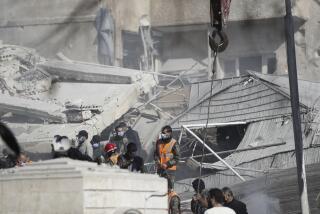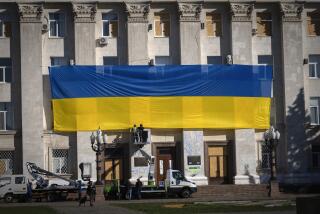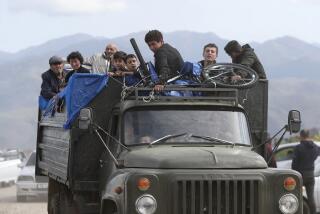Battered Syrian city deals with post-victory reality check
Bullet casings litter the streets, unexploded mortar shells burrow into the pavement. Disfigured buildings stretch block after block.
An Islamic State fighter’s body lies beside an outhouse, a grimace etched into his face, fingers frozen and clawing at the sky.
For four months, outgunned Kurdish fighters held out against Islamic State militants in the city of Kobani, along Syria’s northern border with Turkey. Last week, greatly aided by U.S. airstrikes, the Kurds drove the extremists out, prompting celebrations among 30 million Kurds scattered throughout the Middle East and across the globe.
Yet, the mood has quickly grown somber. The victory increasingly appears Pyrrhic.
“We need to rebuild the city,” said Anwar Muslim, the city’s top official, as he stood amid the destruction. “But we may have to build Kobani somewhere else.”
Kobani is the name of both the city and the surrounding province, considered the most vulnerable of three Kurdish-controlled regions in Syria’s north. Although the battle there became freighted with tremendous symbolic significance, it was of limited strategic value, adding a painful senselessness to the devastation wrought by the Islamic State siege.
Gunfire still rattles out from the city’s eastern fringe. Occasional explosions — shells from Islamic State tanks a few miles away — shake the ground. Kurdish fighters from what are known as People’s Protection Units, or YPG, are still battling Islamic State in hamlets and farmlands outside Kobani.
“It will be difficult to retake the villages,” acknowledged Ismet Sheik Hassan, defense minister of the city, which is known as Kobani to its Kurdish residents but listed officially in Syria as Ayn al-Arab.
The battle for Kobani was difficult, and prolonged. Islamic State began its offensive with heavy shelling and suicide bombers. Then, Hassan said, fighters followed.
“They came with no fear of death,” he said. “They think that, if they die, they will go to heaven.”
The city’s Kurdish defenders held out with a ring of snipers, small teams ambushing militants and blasting rocket-propelled grenades into booby-trapped vehicles bearing down on Kurdish positions.
The U.S. intervention, buttressed by a deployment of fighters from Iraqi Kurdistan known as the peshmerga, probably spared the city from the Islamists. The U.S.-led coalition launched about 700 airstrikes, turning the tide against Islamic State.
“The whole world saw how we resisted Daesh,” Hassan said, using an Arabic acronym for Islamic State. “But the airstrikes saved us.”
On the eastern front, trenches are gouged into the terrain, embankments of dirt stacked high, marking the Kurds’ defensive positions during the siege. Lengths of cloth have been unfurled across streets to obscure the view of Islamic State snipers. The bright colors provide a sharp contrast to the surrounding ruin.
Skeletal buildings buckle. A cat yowls from inside one of them. Trees are charred, their leaves reduced to ash.
In the central city, the decomposing body of an Islamic State fighter shrinks in a pile of clothes. A severed head, lying about a yard away, bares a single gold tooth and a gaping exit wound in the back.
As the fighting escalated here, the often-divided Kurdish factions came to Kobani in a strong show of unity. The Kurdish factions, secular in nature, included many female fighters.
“We came to protect the Kurdish revolution in Syria,” said a fighter for the Kurdistan Workers Party, or PKK, a leftist group in Turkey that has been at war with the government there for three decades. “We will not accept the Arab fascists and fighters from all over the world attacking Kurdish lands,” he said. The fighter, one of a number gathered beside a wood burner fending off the winter cold, declined to give his name for security reasons.
The arrival of the peshmerga fighters from Iraq proved a major boost for the city’s defenders.
“We came here to defend Kurdistan; we are ready to fight at any time,” said Nashwar Mohammed, a peshmerga fighter deployed to Kobani a few weeks ago. “Of course, our relationship with other Kurdish factions is stronger now. All parts of Kurdistan will move closer together.”
The battle for Kobani now moves into a reconstruction phase, one likely to cost hundreds of millions of dollars. It’s unclear who would provide that money. And tense relations between Kobani’s Kurdish defenders and the Turkish government seem certain to complicate the delivery of building materials and other supplies.
Refugees from the city eke out an existence across the border in Turkey, unsure whether there is any point in returning. No one can rule out the possibility of a renewed assault by Islamic State.
So while Kurdish forces can celebrate victory, the sense in refugee communities, and on the streets of Kobani, is that the city’s future is far from assured.
Johnson is a special correspondent. Times staff writer Patrick J. McDonnell in Beirut contributed to this report.
More to Read
Start your day right
Sign up for Essential California for news, features and recommendations from the L.A. Times and beyond in your inbox six days a week.
You may occasionally receive promotional content from the Los Angeles Times.






